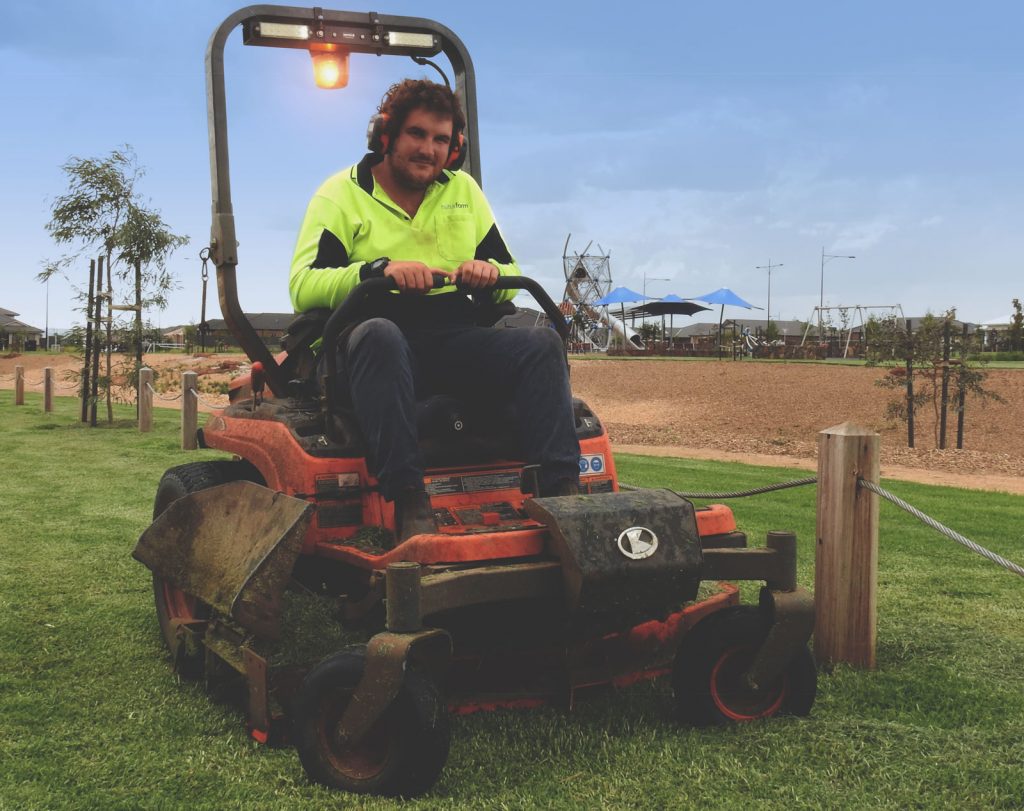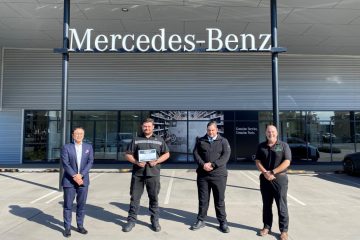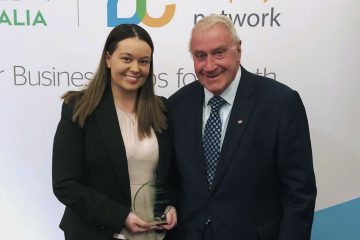Joshua Coulson is a 3rd year horticultural parks and gardens apprentice with WPC Group, working with long term partner Naturform throughout Melbourne’s western and northern suburbs. Josh’s aboriginal heritage is Palawa, from Evandale in Tasmania. His outstanding efforts to date with community, schooling and career saw him named as a finalist at the 2019 Apprentice Employer Network (AEN) awards event held at the Victorian Parliament House for Indigenous Student of the Year.

Below, Josh openly shares his story and insights:
1. When did you first have an interest in horticulture?
I was originally interested in agriculture, in particular the dairy industry, but it seemed to be an industry in decline. I then thought best to move my career aspirations in another direction. I have always had an interest in plants and gardens, so I decided to complete my Certificate II in Horticulture whilst at school and found that I really enjoyed it and decided that this would be my career pathway.
2. In what way did the exposure to horticulture whilst at school benefit you?
It gave me so much experience specific in horticulture, but also to work in general. I started my apprenticeship two days after finishing school and it was my first job. So far, I have gained a lot of knowledge on plants, irrigation set-ups and also, how to use a wide range of tools and equipment.
3. You started an apprenticeship two days after completing school which is very impressive. How have you found the apprenticeship pathway?
I have learnt a lot in my apprenticeship, but have also been able to bring some of my own skills to the workplace. In this industry, there are a lot of different ways to complete tasks, and sometimes I share my own ideas and ways of doing things. Sometimes it works out and we adopt that method, other times, we stick to the existing way of doing things, but it is good practice to share ideas.
4. What have been some of your challenges and how did you overcome them?
One of the biggest challenges that I’ve faced so far has been the irrigation programs. The first few times I was exposed to them, I did not know how to set them up, so I had to use my problem solving skills and eventually, was able to figure it out.
Another challenge that came up at work was when a contractor was working with us and they were working in a very unsafe manner. Their conduct was so risky that it could have put others in danger. It was a challenging situation, and I found the courage to speak up to the supervisors about this conduct. This person now does not contract at our sites and it is a lot safer. I have to use my initiative almost every day at work. We have a set schedule of tasks, but often due to weather or other reasons we have to change our plans. It is important to be thinking ahead and to use your initiative and also to work in a manner that is efficient, yet safe.
5. While an apprentice, you also undertake formal study. How have you found this?
In my role, I often speak with people about my training and the many things I am learning. One of the best things about trade school is that all of the students have very different workplaces and ways they complete the same tasks.
We are able to learn a lot from each other and the different experiences we have, as well as all the formal, recognised training we undertake together in class. I often use the ideas from other students’ workplaces to enable ours to be more efficient.
I enjoy teaching others and helping them when they need assistance. At trade school we share ideas and it is nice to impart some of my knowledge to others in the classroom.
6. You are part of a wider team that travel and complete tasks and projects together. Can you share your thoughts on teamwork and how you contribute to the team culture?
The best part about teamwork is the enjoyment that I get from working with people. When I am working with others it feels less like work and more like completing a task with friends. I like the feeling of a close team, it is like a family. When everyone gets along, you are able to work a lot better together and are often more efficient.
I think that the best way to influence others around you is to be positive. I like to think that if you are positive then you are also approachable. There are times when people may not know how to do something and it is important to help them, especially if you would like the same treatment back to you. I think another important part of influencing others is to be polite and respectful, especially as at work you are not only representing yourself, but your company as well.
I show leadership at work at times, especially when there are contractors around that are new and I have to teach them the particular ways we do things that might be different to other employers.
7. Your aboriginal heritage is Palawa in Evandale, Tasmania. How are you involved in your community?
I feel a great connection to my community through my mum, particularly through the work she does as an Aboriginal Health Liaison Officer with the Victorian Aboriginal Community Controlled Health Organisation. Her role aims to close the health gap between Indigenous Australians and non-Indigenous Australians. She also attends various Indigenous conferences around the country.
I believe that my training has impacted the community in a positive way. It has shown other Indigenous youth that they can get an apprenticeship which will give them a qualification and work experience in an industry they love. I hope that I have shown them that they can have a long-term career as well. I have had the opportunity to help run various NAIDOC week events around the Geelong area, one, in particular, was the raising of the flags ceremony that I helped coordinate. I was also a VicRoads Indigenous Youth Scholarship recipient in High School, of which there were only two winners in Victoria, including myself. I now am able to mentor young Aboriginal and Torres Strait Islander students in High School and show them positive outcomes they can achieve with hard work. I also want to continue helping my mum in closing the health gap and will always continue to help with NAIDOC week ceremonies and activities.


